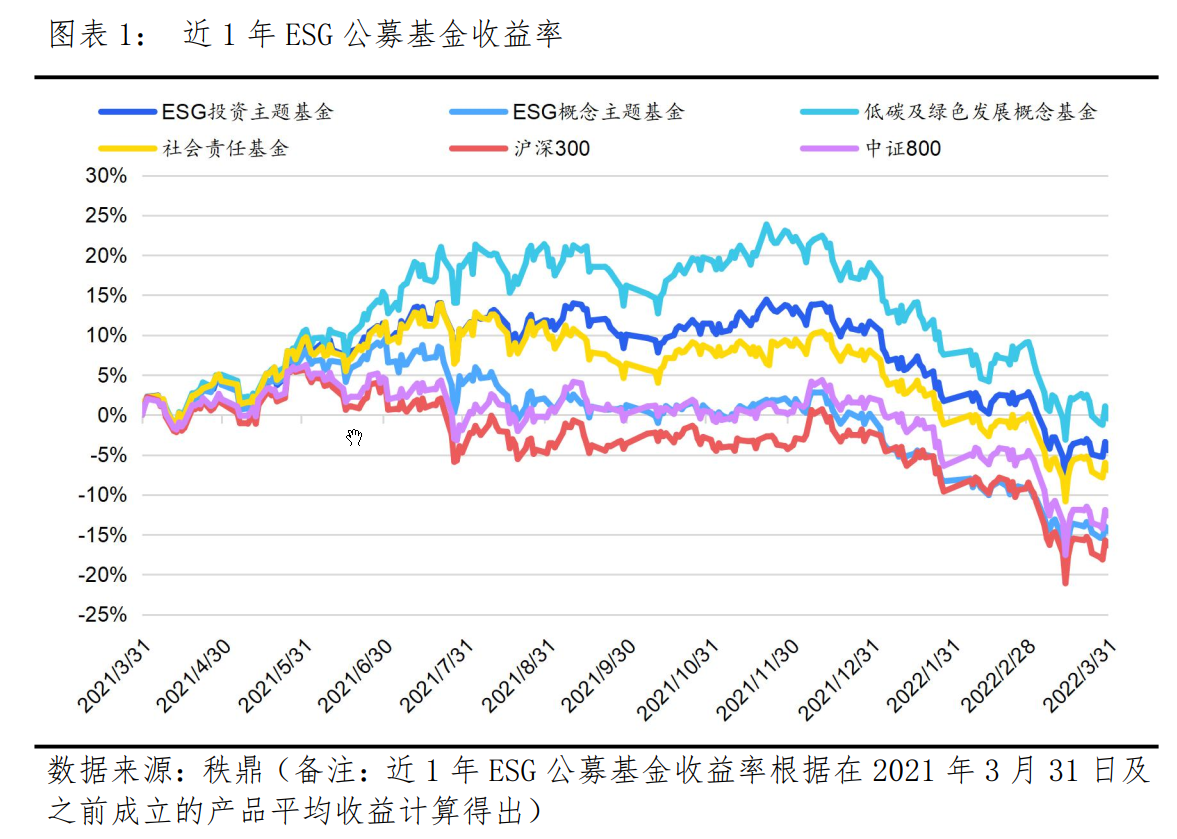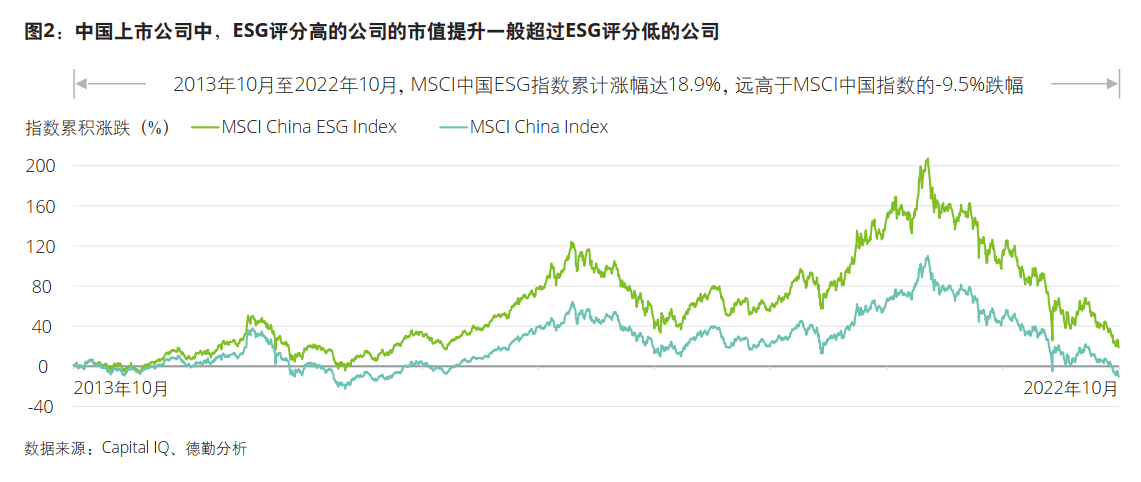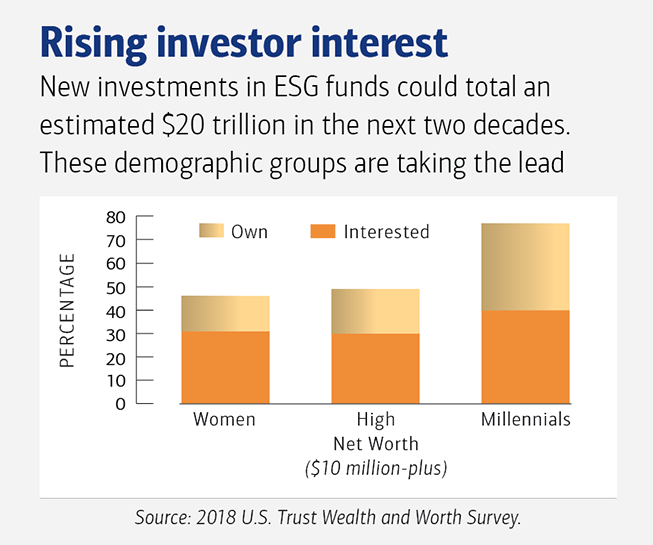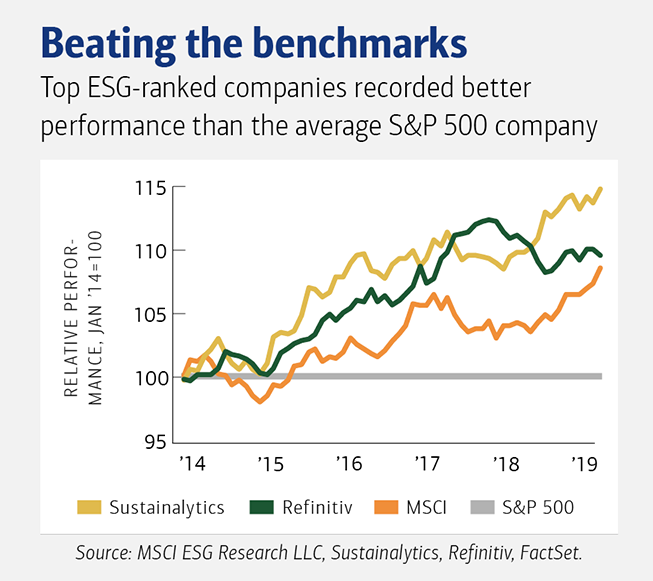ESG 为何重要
ESG 为何重要
环境、社会这两个范畴的议题关系到人类整体——原因在于,人类生活在这些议题的影响之中。而管治(Governance),则影响着地球上的各类实体,如经济组织,特别是目前应用最广的经济组织:公司。
所以,环境、社会和管治这三样的影响力几乎涵盖人们生活的方方面面,特别是经济活动的方方面面。而经济活动越来越多地对环境造成影响。为了一个可持续的未来,让商业活动也变得可持续,将是人类恒久的努力方向。
因此,ESG变得极为重要。
本文更新至:2024年7月
为什么要在中国关注 ESG
国务院发展研究中心金融研究所副所长陈道富对于为何要关注ESG提出三点观察:
ESG投资提供了对公司的拓展性认识,特别是对于有限责任公司,引进ESG理念进一步拓宽了公司的概念,公司是充分互动的,具有相对独立性的,内嵌于自然、社会的共同体。
公司价值的评估会反映市场共识的变化。经济水平增长到一定程度以后,社会公平、环境等问题都会被关注。在上个世纪20年代末我们可以看到这个趋势,现在我们又看到这种趋势。一旦成为趋势,它就会在价格里面反映出来。
中国当前推动ESG,与我们的倡导的新发展理念、高质量增长和“双碳”目标等战略是高度一致的,也被各个部门贯彻并实施。我们不仅重新评估投资对象,投资对象也在被ESG改造。
2022 ESG 白皮书
灼鼎咨询发布了2022年ESG发展白皮书,供参考
2022 中国 ESG 发展创新白皮书
社会价值投资联盟与华夏基金管理有限公司联合发布了《2022 中国 ESG 发展创新白皮书》,供参考
对于投资者而言
当环境、社会的议题逐渐成为主流,越来越多的投资者加入了“负责任”的行列,响应UNPRI的负责任投资原则,这是不可逆转的潮流
哈佛法学院的研究表明,ESG评分与公司的盈利能力成正比
与道琼斯指数和标普500指数相比,MSCI ESG Leader指数具有稳定的超额收益。2011-2017年间,MSCI ESG Leader指数的收益率高於道琼斯指数和标普500指数的收益率。以2011年作为基年,2011-2017年间,MSCI ESG Leader指数投资的累计收益率为114.99%(复利收益率为182.23%),标普500指数为100.85%(复利收益率为146.67%),道琼斯指数为95.77%(复利收益率为140.41%)。
运用ESG投资理念有利于风险控制。ESG作为综合评判公司环境、社会和公司治理能力的指标有利於从非财务角度进行排雷。
ESG与公司财务绩效有相关性,主要原因为:
- ESG表现优异的公司能够降低公司特定风险;
- ESG表现优异的公司对声誉具有积极影响;
- ESG表现优异能够增强客户黏性,改善公司运营,提升公司财务绩效;
- ESG表现优异的公司在面临极端下跌环境中,具有更强的抗风险能力。
近1年(2021年3月31日至2022年3月31日,下同)ESG公募基金业绩表现优异。低碳及绿色发展概念基金收益最佳,近1年收益率远高于沪深300和中证800收益率。此外,ESG投资主题基金、社会责任基金近1年较沪深300和中证800均有明显超额收益。
证券时报《中国ESG发展白皮书(2021)》

- 纽约大学商学院研究:由于诸如改进风险管理和更多创新等中介因素,企业的可持续发展举措似乎推动了更好的财务表现 (Sustainability initiatives at corporations appear to drive better financial performance due to mediating factors such as improved risk management and more innovation) ;研究表明,为低碳未来进行管理能提高财务绩效(Studies indicate that managing for a low carbon future improves financial performance)(ESG and Financial Performance报告全文)
对于监管方
- 当环境、社会议题不可阻挡地成为主流时,对公司等经济实体的这些议题进行强制或半强制披露要求,是符合大众利益的;
- ESG的披露逐渐形成了诸多具体而可行的框架,可作为监管的有效工具。
A股公司的 ESG 表现 ROE 研究
根据《碳中和目标下ESG体系对资本市场影响研究——基于不同行业的比较分析》(刊于《绿色金融》2022年第3期(总第512期)):
通过对上市公司 EPS 进行实证分析,以行业分类和企业 ROE 作为控制变量进行回归分析。结果表明 ESG 的综合评分对企业 EPS 显著正相关。其中 E、S、G 三项指标对企业 EPS 影响不同,S(社会责任)对企业EPS影响最大,其次是E(环境因素),G(公司治理)与企业EPS没有显著相关性。实证数据说明上市公司在披露自身利润的同时,仍须披露环境维护、社会责任等相关项目,落实碳中和行动的方案;
ESG 对金融行业上市公司 EPS 影响最大,然后是制造业,最后是能源及大宗商品类,然而ESG的评分对其他类行业EPS的影响并不显著。
根据实证结果,在上市企业分类中,E(环境)指标对各行业的影响最大。这体现了我国绿色金融和绿色发展布局正逐步被各方重视,并对资本市场产生影响。
对于经济实体而言
一个经济实体——特别是公司,需要达到可持续的发展,出于下列要求,必须对ESG加以重视
- 出于对环境、社会的负责任态度;
- 出于对股东的负责任态度,要在监管和投资者均支持可持续发展的经济环境里,重视ESG才能提升公司价值——越来越多的投资者开始对ESG有所要求,那么公司也应行动起来;
- 在监管环境下,ESG的披露只会越来越严格,这将逐渐造成逆淘汰;
- 基于顾客、消费者的道义要求,公司必须日趋关注ESG议题。
ESG 表现与公司市值的正相关
德勤2022年12月发布报告《放眼当下、 造福未来ESG助力企业在投后整合中释放价值》。报告中提到,ESG 评分水平与公司的市值正相关。

市值提升
德勤通过对MSG中国ESG指数的回测发现, 2013年10月至2022 年10 月期间, MSCI 中国ESG 指数累计涨幅达到18.9%, 远高于MSCI 中国综合指数-9.5%的跌幅。 ESG投资策略在中国市场的超额收益主要来源于以下三点:
由于国内ESG普及程度低, ESG策略可以筛选出关注长期价值增长、 具有优秀社会影响的企业。
ESG与国家战略(碳中和、 实现共同富裕) 大方向一致, 优秀ESG公司业务受到政策支持。
ESG投资渗透率较低, 增量ESG资金买入优质资产, 推动估值上升。
财务回报
ESG 评级高的企业往往在成本控制、 生产效率、 运营效率及公司风险管理和公司治理方面表现优异, 形成较强的竞争优势。 这种竞争优势在上市公司身上体现为具有较强的盈利能力, 同时降低了公司的系统性风险, 最终使投资者受益。
ESG 为公司带来什么
以下数据引自德勤2022年12月报告《放眼当下、 造福未来ESG助力企业在投后整合中释放价值》
品牌差异化: 越来越多的消费者对注重ESG理念的品牌表现出更强的偏好和品牌忠诚度。 市场调研显示, 致力于可持续发展的品牌在品牌价值及品牌传播度等方面均表现更好。
创新与机会创造: ESG评级高的公司更注重通过创新实现长期价值创造, ESG领军公司更容易成为行业领先技术和商业模式的缔造者。
运营效率: 践行ESG理念的公司不仅自身注重节能增效, 而且通过成功实践分享、 ESG标准输出等对产业链上下游合作方(尤其是供应商) 能产生积极影响。 调研显示, 通过对运营商进行ESG评估, 鼓励供应商减少资源使用的公司最高可将运营成本降低45%。
融资渠道: ESG评级高的公司往往运营效率更高、 风险管理更好、 公司治理结构更优, 相较于同等条件下的其它公司, 可通过低利率的绿色债券等渠道减少平均资金成本。
风险预防: 随着消费者观念的转变和社交媒体的快速发展, 因ESG公关危机导致的品牌价值损毁事件频发, 在日常管理中嵌入ESG理念有利于降低黑天鹅事件发生机率。 调研显示, 90%的消费者会因为不负责任的商业行为而更换、 抵制或支持一个品牌。
人才体系建设: ESG评级高的公司往往更以人为本, 充满包容力的企业文化和对于长期价值创造的注重有利于吸引并留存优秀人才。 调研显示, 61%的员工认为ESG对公司管理来说不可或缺, 并且46%的员工表示他们只为具有可持续商业行为的公司工作。
How do ESG policies benefit your business? /ESG 政策是如何利于您的事业的?
Quote from How do ESG policies benefit your business
More and more businesses are being introduced to the multi-faceted and all-permeable benefits of ESG like attracting talent, targeting future consumers, facilitating brand-enhancement and innovation. Overall, ESG equips the business to become resilient in the current and possible future scenarios. Let us break down its major benefits in detail to understand why ESG is more important now than ever:
Adds to the top-line growth
It’s easier for businesses to enter new markets and expand their operations in the existing markets if they have a strong ESG approach. Governments facilitate access by giving licenses and issuing permissions to such companies.
As per GreenPrint’s Business of Sustainability Index report released in March 2021, 75% of Millennials are willing to pay more for an environmentally sustainable product in the US and 77% of the overall sample size are concerned about the environmental impact of products they buy.
Leads to reduction in the costs
Companies which switch to more sustainable methods of production tend to be more efficient and reduce their costs. One such example is Nestlé, which announced that it will invest up to USD 2.1 billion by 2025 to shift from virgin plastic packaging to food-grade recycled plastics and the development of other sustainable packaging solutions. This will not only help it cut its carbon footprint but also save it from non-compliance costs among different geographies where it operates and have stricter laws related to the use of plastic packaging.
Effective management of regulatory compliances and stakeholders
All businesses are affected by some or other forms of regulations depending upon the markets they operate. The business with strong ESG measures, especially on Governance, invite less scrutiny from the regulators and have greater operational freedom. They also face less pressure from climate change from activists, employee unions etc. The consumers also prefer such brands too. For example, Starbucks introduced “Starbucks China Parent Care Program” in 2017 which provided health coverage to over 10,000 parents of Starbucks’ employees in China. It was seen as a strategic move as Starbucks planned to expand in China amid the growing trade dispute between USA & China.
Attracting talent and boosting employee’s productivity
It is noted that strong companies with good ESG scores attract better talent and have longer retention. Having a clear sustainability agenda generates an internal sense of pride among employees. The younger generation prefers to work for companies with stronger commitments towards society. As per a study by Cone Communications on Millennial Employee Engagement in 2016, 64% of Millennials consider a company’s social and environmental commitments when deciding where to work.
全球趋势
Quote from Why ESG matters—now more than ever
The findings come at a time when sustainable investing is rapidly transforming from a niche of the investment world into what looks like an unstoppable force. Based on U.S. demographic trends, Savita Subramanian, Head of U.S. Equity & Quantitative Strategy for BofA (Bank of America) Global Research, estimates that the amount invested in ESG funds could rise by $15-20 trillion over the next two decades. “That’s equivalent to the size of the S&P 500 today,” she notes.

Past performance is no guarantee of future results.
Europe represents almost half of the current $30.7 trillion of investable assets in sustainability funds, according to the Global Sustainable Investment Alliance. “The rise of eco-political parties in power in Europe, a swell of millennials and ‘green’ investors have driven a groundswell of interest and awareness of the potential of ESG as both a financial investment and a way to help achieve broader goals,” says Subramanian.
Awareness also is on the rise among investors and companies in the United States. The Global Primer points to a “sea-change in U.S. corporate responsibility,” where companies are recognizing the importance of investing in employees, taking care of the environment and other issues.
Avoiding corporate ‘blunders’
Among U.S. companies on the S&P 500 index, those that scored in the top fifth of ESG rankings outperformed their counterparts in the bottom fifth by at least three percentage points every year for the past five years, the report found. [1]

Past performance is no guarantee of future results.
The report also found that ESG metrics have shown to be better at signaling a company’s future earnings than traditional financial measures like its level of debt.[2]
They also helped investors avoid losses related to “ESG blunders”—when companies become embroiled in regulatory and/or public relations crises. Such missteps by U.S. companies eliminated more than $500 billion in market capitalization from 2014 to 2019.[3]
“Based on our findings, we believe that ESG considerations are no longer simply another option for investors,” Subramanian says. “They are an essential part of the investing process.”
[1] MSCI ESG Research LLC, FactSet, Refinitiv, Sustainalytics, BofA Global Research U.S. Equity & Quant Strategy
[2]Based on median change in 3yr EPOS volatility of S&P 500 companies over subsequent three years, based on Refinitiv Overall ESG score from 12/2005-12/2015 (with volatility through 12/2018)
[3]Includes 24 major S&P 500 corporate controversies related to data breaches, accounting scandals, sexual harassment and other ESG matters.The information above is extracted from a previously published research report dated November 25, 2019, which contains additional information and important disclosures. The report may be found here
附录:
ESG 是如何利于公司和投资者的
Strong ESG Practices Can Benefit Companies and Investors: Here’s How
From Nasdaq, author: Betsy Atkins
Environmental, social and governance (ESG) issues should be a top concern of corporate management and boards. There was a time when a public stance on ESG issues was a public relations tactic. However, in today's rapidly changing business climate, attention to ESG issues is becoming critical to long-term competitive success.
Major institutional investors recognize this and are making it clear that they expect the companies they hold to take a proactive approach to ESG policies and messaging. In his annual letter to CEOs, Blackrock's CEO Larry Fink wrote "a company's ability to manage environmental, social, and governance matters demonstrate the leadership and good governance that is so essential to sustainable growth, which is why we are increasingly integrating these issues into our investment process." During the 2017 proxy season, State Street Global Advisors (SSGA) put this ethos into action by voting against the re-election of directors at 400 companies that SSGA said failed to make any significant effort to appoint women to their all-male boards.
The advantages of proactively tackling ESG issues go beyond appeasing institutional shareholders and creating a good public relations story. A robust ESG program can open up access to large pools of capital, build a stronger corporate brand and promote sustainable long-term growth benefiting companies and investors. Here's how:
1.Strong ESG programs can increase stock liquidity.
Individual and institutional investors alike are investing massive pools of capital in corporations that proactively govern and operate in an ethical and sustainable manner. Sustainable and impact investing is actively growing at double-digit rates. In fact, according to the US SIF Foundation, total U.S.-domiciled investments using sustainable, responsible and impact (SRI) strategies, reached $8.72 trillion, an increase of 33 percent from 2014 and a 14-fold increase since 1995. That represents about one of every 6 dollars under management.
Investment research and consulting firms like Sustainanalytics and MSCIhave developed indices that measure and rank companies based upon ESG criteria relative to their industry peers. The investment funds and ETFs that benchmark these indices are raising trillions of dollars to be deployed toward companies that execute sound ESG policies; these are long-term oriented shareholders that can potentially fuel demand for your stock.
Many investment firms are also incorporating ESG evaluations in their portfolio risk assessment, which is a telling indicator that capital will continue to flow towards companies with strong ESG programs and practices.
2.ESG initiatives can unlock competitive value.
Companies that recognize the importance of adapting to changing socio-economic and environmental conditions are better able to identify strategic opportunities and meet competitive challenges. Proactive and integrated ESG policies can widen a company's competitive moat relative to other industry players.
Starbucks (Nasdaq: SBUX) learned this as they were trying to expand their market share in China. For years after entering that market, Starbucks struggled to gain momentum on expansion. They stumbled upon the answer when they offered healthcare to their employees' parents. Once they did that, sales growth skyrocketed and now Starbucks has 2,000 stores in one of the fastest growing markets on the globe.
Executives who take steps to improve labor conditions, enhance the diversity of their teams, give back to their communities, and take a stand on sustainable environmental policies also strengthen the company's brand. As millennials in particular become employees, consumers, and investors, they take note of good corporate actors and reward them with loyalty.
3.A proactive stance on ESG issues can keep activists at bay.
Activists have used governance weaknesses as a tool in proxy contests and campaigns against companies for years, but increasingly they are targeting management teams and boards that fail to take a proactive stance on potential environmental or social issues.
Companies that proactively address ESG issues can set the bar for the entire industry and at the same time help immunize themselves against activist intervention. Wynn Resorts (Nasdaq: WYNN) recently embraced their commitment to gender diversity by increasing the number of women on their board from one to four. With a board that is 36% female, Wynn is now in the top 40 S&P 500 companies in terms of female board representation.
If your company does become the target of an ESG-focused activist, don't despair. Activist investment firms and hedge funds are establishing their own ESG funds, such as ValueAct Capital and Jana Partners. Many of these investors are interested in collaborating with companies to develop ESG policies that unlock the long-term value we mentioned above. For example, Jeff Ubben, CEO of ValueAct Capital, recently joined the board of energy company AES Corporation to help continue the company's transition to clean and renewable energy sources (following divestiture of its coal assets).
4.ESG Investors are "stickier."
ESG investors are values-based investors who are more interested in what happens during the next decade than the next quarter; they understand that change takes time. Investors incorporating ESG into their mandate often work alongside a company to strengthen it, as they are more interested in building long-term value over a multi-year period than in flipping the stock in the near term for a "sugar high."
5.Companies that espouse strong ESG values tend to attract and retain the best talent.
Millennials care deeply that the companies they work for (and the businesses they support) embrace values that are aligned with their own, and environmental and social responsibility are very important to them. Employees who are passionate about the organization, who are loyal, and who feel valued drive an intangible good will that strengthens the brand of the company and improves the overall productivity of the workforce.
